Assisted Living
Family and Caregiver Support - Navigating Challenges
Caregiving is a crucial yet challenging role. Whether it’s the support of an aging parent, a spouse with chronic illness, or a loved one with special needs, being a caregiver can be a deeply emotional and physically demanding experience. As a family member or caregiver, you’re responsible for someone’s well-being and navigating a landscape that can sometimes feel overwhelming.
In this blog, we’ll explore the importance of family and caregiver support, the challenges caregivers face, and some practical tips to help you care for both your loved one and yourself.
 The Importance of Family and Caregiver Support
The Importance of Family and Caregiver Support
Family and caregiver support are the foundations of a loved one’s well-being. Whether it’s helping with day-to-day tasks or providing emotional care, your role is critical to their comfort and happiness. However, it's essential to recognise that caregiving isn’t just about the person being cared for; your own well-being matters too. Supporting caregivers, through both emotional and practical means, strengthens the family unit and ensures that caregivers are better equipped to handle the demands of the role.
Practical Tips for Caregivers
Time can sometimes feel like it is constantly running away from you, and it can be very hard for a caregiver to take time for themselves. Creating a structured schedule can help balance caregiving and personal time, making daily tasks more manageable.
You don’t have to do it all alone—ask for help from family, friends, or professionals. Accepting support ensures the best care for your loved one while giving you the break you deserve.
Prioritizing self-care is essential. Whether it’s a walk, yoga, or a quiet moment with a book, taking time for yourself helps you stay strong. And don’t be afraid to delegate—sharing responsibilities prevents burnout and makes caregiving a little easier for everyone involved.
Resources Available to Caregivers
Thankfully, there are numerous resources designed to support caregivers
- Respite Care: Temporary care services that allow caregivers a break to rest and recharge.
- Support Groups: Local or online support groups where caregivers can share experiences, offer advice and find emotional reliefFinancial Assistance: Programs such as Medicaid, Veterans Benefits, and local charity organisations can provide financial support for caregiving costs.
The Role of Technology in Caregiving
Technology can make caregiving easier and less stressful. Apps that provide medication reminders help you keep track of prescriptions and appointments, ensuring your loved one stays on schedule. Emergency alert systems, like fall detectors or emergency buttons, offer peace of mind by making help instantly accessible when needed. Smart home devices, such as voice-activated assistants and automated lighting, can also simplify daily tasks, creating a safer and more manageable environment for both you and your loved one.
How Tenura Can Help Ease the Caregiving Journey
At Tenura, we understand the challenges that caregivers face daily, which is why we’ve designed a range of products to make caregiving easier, safer, and more comfortable. Our innovative, non-slip silicone aids are specifically created to provide enhanced grip and reduce the risk of accidents, whether you’re assisting with mobility, handling medication, or managing daily tasks.
From Grip Strips for easier handling of items like containers, appliances, and tools, to Non-Slip Mats that keep items securely in place, our products are designed to reduce any physical strain. This allows you to focus on what matters most, without worrying about slipping, accidents or muscle fatigue.
Our products also support independence for those you care for, helping them confidently engage in daily activities. By incorporating Tenura’s practical solutions, you can create a safer environment, reduce physical stress on both yourself and your loved one, and ultimately improve your caregiving experience.
Caring for a loved one is never easy, but Tenura is here to help make the journey a little smoother, safer, and more manageable.
You are not Alone
Caregiving is an incredibly demanding yet rewarding role, and it’s important to remember that you are not alone. Your love and dedication matter more than you might realise. Be kind to yourself, celebrate the small victories, and don’t hesitate to ask for support when you need it.
You are making a difference, and by seeking help and prioritizing your well-being, you can continue to provide the best care possible for your loved one.
Regulatory Updates and Professional Standards
In the ever-evolving landscape of health and therapy, keeping up with the latest regulations, standards, and best practices is crucial for professionals committed to providing the highest level of care. This is particularly true when it comes to the use of disability aids. In this blog, we'll explore some recent regulatory updates, emerging professional standards, and best practices in the industry that you need to know.
The Importance of Staying Updated
Regulatory bodies continuously update their guidelines to ensure that healthcare products, including disability aids, meet the highest safety and efficacy standards. For professionals in the health and therapy sectors, staying informed about these changes. Compliance ensures that your products and services are safe, reliable, and practical, crucial for patient well-being and trust.
Recent Regulatory Updates
Post-Brexit CE Marking Adjustments
The UK's departure from the EU has led to significant changes in the regulatory landscape, particularly concerning CE marking. Now, disability aids in the UK require the UKCA marking (UK Conformity Assessed) to be sold legally. This shift necessitates that manufacturers and distributors of disability aids ensure their products comply with the new UK standards. Professionals need to verify that the aids they recommend or provide are properly certified.
 ISO Standards for Assistive Products
ISO Standards for Assistive Products
The International Organization for Standardization (ISO) periodically revises its standards for assistive products, ensuring they meet the latest technological advancements and safety requirements. The ISO 9999 classification, for example, is regularly updated to include new categories of assistive devices and refine existing classifications. Staying informed about these changes can help professionals recommend the most current and effective products to their clients.
Health and Care Professions Council (HCPC) Guidelines
The HCPC, which regulates health and care professionals in the UK, has updated its guidelines to emphasise the importance of continuous professional development in line with new standards and practices. For those specialising in occupational therapy, physiotherapy, or any field involving disability aids, adhering to these guidelines ensures that your practice remains aligned with the latest professional standards.
Emerging Best Practices in Disability Aids
Emphasising Individualised Care
The trend towards personalised medicine has reached the realm of disability aids, with a growing emphasis on tailoring products to individual needs. This approach improves patient outcomes and aligns with regulatory expectations for patient-centred care.
Sustainable and Ethical Practices
Sustainability is key in manufacturing and using disability aids. Professionals should be aware of products made from eco-friendly materials and companies that prioritise ethical manufacturing practices. Not only does this align with broader societal goals, but it also resonates with increasing clients who are conscious of their environmental footprint.
Integration of Smart Technology
Integrating intelligent technology into disability aids is an exciting development, offering enhanced functionality and greater user independence. Professionals should familiarise themselves with the latest intelligent aids, from sensors that monitor usage patterns to apps that allow for remote adjustments, ensuring they can have the familiar solutions for their clients.
Keeping up with regulatory updates and professional standards is essential for any health or therapy professional who works with disability aids. By staying informed, you not only ensure compliance but also enhance the quality of care you provide to your clients. The landscape is constantly changing, but with a commitment to learning and adaptation, you can remain at the forefront of your field, providing the best possible support to those who rely on your expertise.
Superhuman Day: Celebrating Resilience and Empowering Independence
September 7th is Superhuman Day, a special occasion dedicated to celebrating the incredible strength, determination, and resilience of those who overcome daily challenges with grace and grit. This day is all about recognising individuals who navigate life with disabilities, chronic illnesses, or any condition that requires them to push beyond the ordinary, achieving extraordinary feats in their daily lives.
What is Superhuman Day?
Superhuman Day was created to shine a spotlight on those who defy the odds every day. It’s a day to honour the people who live life to the fullest despite facing physical or mental challenges, inspiring those around them with their courage and perseverance. Whether through small victories or significant milestones, Superhuman Day is a reminder that every achievement is worth celebrating.
The Spirit of Superhuman Day
The essence of Superhuman Day lies in the belief that everyone has the potential to be a hero in their own right. It’s not just about grand gestures or monumental accomplishments; it’s about the everyday acts of bravery and determination that make a real difference in people’s lives. From adapting to new ways of living to find creative solutions to overcome obstacles, those we celebrate on Superhuman Day remind us of the incredible power of the human spirit.
How Tenura Can Support Your Superhuman Journey
At Tenura, we believe that everyone deserves the opportunity to live independently and confidently. Our range of daily living aids is designed to enhance independence by making everyday tasks more accessible and safer. Whether through our anti-slip mats that provide stability, jar openers that offer extra grip, or non-slip fabrics that keep items secure, Tenura products are here to support you in your journey toward greater independence.
Our mission is to help individuals by providing daily living aid solutions that improve their quality of life. On Superhuman Day, we’re proud to stand with those who demonstrate extraordinary resilience and offer tools that help them unlock their full potential.
Innovative Therapy with Tenura: Silicone Aids for Better Rehab
Innovative Therapy Techniques with Disability Aids
Innovation is key to enhancing patient outcomes and improving quality of life in therapy and rehabilitation. Silicone-based disability aids, such as those offered by Tenura, are making significant strides in this area. These aids are versatile and durable and play a crucial role in daily living and rehabilitation. This blog explores how Tenura’s silicone products can effectively integrate into therapy and rehabilitation, offering support during and after recovery.
The Benefits of Tenura Daily Living Aid Products
Tenura’s silicone aids are designed to assist individuals in various rehabilitation and daily living stages. Here’s how these products can benefit users:
1. Supporting Daily Activities
Tenura’s daily living aids, such as non-slip mats, jar openers, and ergonomic grips, offer practical support for everyday tasks. These aids help individuals with limited dexterity or strength perform activities like cooking, cleaning, and dressing more easily. By integrating these products into daily routines, users can maintain independence and improve their quality of life.
2. Enhancing Motor Skills Development
During rehabilitation, Tenura’s silicone aids provide valuable support for motor skills development. Products like cutlery grips are designed to strengthen muscles, improve coordination, and enhance fine motor skills. These aids can be used in various therapeutic exercises, helping individuals regain functionality and confidence in their abilities.
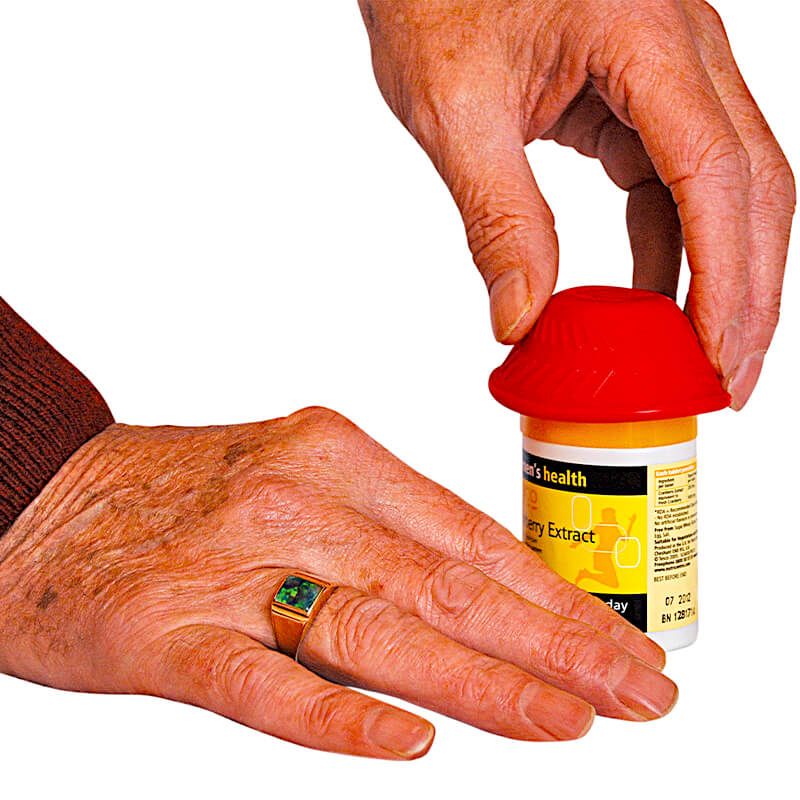 3. Providing Comfort and Pain Relief
3. Providing Comfort and Pain Relief
Comfort is a crucial aspect of rehabilitation, and Tenura’s silicone aids offer solutions for pain management and comfort. Making everyday tasks more accessible with the jar openers can help reduce pain. Our daily living aid products help enhance overall comfort during the rehabilitation process.
4. Facilitating Assistive Technology Use
Tenura’s silicone aids are designed to complement assistive technology, making it more accessible and user-friendly. Silicone grip strips can improve the usability of adaptive devices, such as controllers and communication tools, ensuring that individuals with limited dexterity can use technology effectively.
Long-Term Benefits of Tenura Products
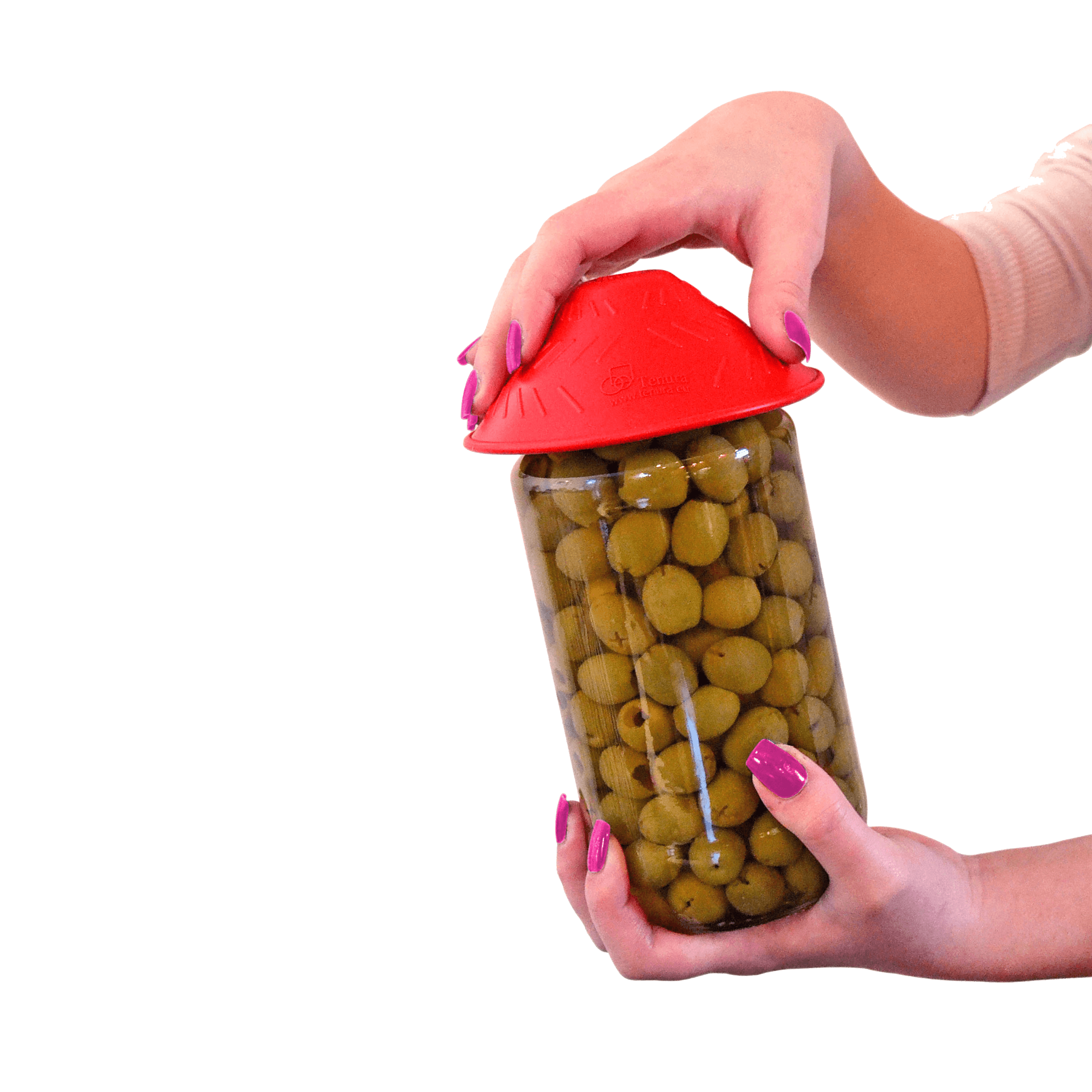 Sustained Independence
Sustained Independence
By integrating Tenura products into daily routines and therapy, individuals can enjoy long-term benefits such as sustained independence and improved self-care capabilities. These aids support users in performing everyday tasks with greater ease, promoting a sense of autonomy and confidence.
Enhanced Quality of Life
Tenura’s silicone aids contribute to an enhanced quality of life by addressing both practical and therapeutic needs. The combination of functional support and therapeutic benefits helps individuals maintain their lifestyle and well-being during and after rehabilitation.
Ongoing Support
Tenura products provide ongoing support beyond the rehabilitation phase, helping individuals adapt to changes in their abilities and maintain their independence. The durability and versatility of these aids ensure that they continue to be valuable tools throughout a user’s journey.
Tenura’s innovative silicone aids transform therapy and rehabilitation by offering practical support, enhancing motor skills and providing comfort. These products play a vital role in daily living and long-term well-being, helping individuals maintain independence and improve their quality of life. For more information on how Tenura’s daily living aids can support you or your patients, contact us today and discover the benefits of our versatile daily living aids.
The Transformative Power of Assisted Therapy Dogs & Helpful Dog Products | Tenura
Dogs have an extraordinary ability to enhance our lives in countless ways, serving as loyal companions, sources of comfort, and even as invaluable assistants in daily tasks. In particular, assisted therapy dogs play a vital role in providing support to individuals facing physical, emotional, or cognitive challenges. Through their unwavering loyalty and affection, these remarkable animals contribute to the well-being and quality of life of those they serve.
The Power of Assisted Therapy Dogs:
Assisted therapy dogs, trained to provide therapeutic support to individuals in need, offer a myriad of benefits that improves both physical and mental health. For individuals’ disabilities, therapy dogs can assist with mobility, rehabilitation, and sensory stimulation, thereby improving overall physical function and independence. Moreover, the presence of a therapy dog has proven to reduce stress levels, depression and anxiety while promoting relaxation and boosting mood, making them invaluable allies in the realm of mental health and emotional well-being.
One need only hear the heartwarming stories of individuals whose lives have been changed by the companionship and assistance of therapy dogs to understand the profound impact these animals can have. From helping a child with autism navigate social interactions to providing comfort and companionship to elderly individuals in nursing homes, the therapeutic benefits of assisted therapy dogs are truly remarkable.

Common Breeds of Assisted Therapy Dogs:
Golden Retriever: Renowned for their gentle temperament, intelligence, and innate desire to please, Golden Retrievers are frequently chosen as therapy dogs. Their friendly personality and ability to connect with people of all ages make them ideal companions for individuals in need of emotional support or assistance.
Labrador Retriever: Labrador Retrievers are another popular choice for therapy work due to their affable nature, trainability, and versatility. Their outgoing personalities and ability to engage with humans make them well-suited for tasks such as guiding individuals with visual impairments or providing comfort in therapeutic settings.
German Shepherd: Known for their loyalty, intelligence, and protective instincts, German Shepherds are often employed as service dogs in various capacities, including assisting individuals with physical disabilities or providing emotional support in therapy settings. Their natural aptitude for obedience training and strong bond with their handlers make them valuable assets in the field of assisted therapy.
Poodle: Poodles are highly regarded for their intelligence, hypoallergenic coat, and gentle demeanour, making them excellent candidates for therapy work. Standard, Miniature, and Toy Poodles are all utilised in therapy programs, where their calm and patient demeanour can provide comfort and companionship to individuals in need.
Cavalier King Charles Spaniel: Based on their affectionate nature, friendly disposition, and small size, Cavalier King Charles Spaniels are well-suited for providing emotional support and companionship to individuals in various therapeutic settings. Their gentle demeanour and adaptable nature make them cherished therapy companions.
Acquiring an Assisted Therapy Dog:
Individuals interested in acquiring a therapy dog have several avenues to explore. One option is to contact certified therapy dog organisations that specialise in training and certifying therapy dogs. These organisations often have specific requirements for both dogs and handlers and can provide guidance on the process of obtaining and training a therapy dog. Alternatively, individuals can investigate local therapy dog programs or facilities in their area that utilise therapy dogs in therapeutic settings. These programs may offer opportunities for volunteer work or provide information on how to become involved with therapy dog teams. For those who already have a dog with the appropriate temperament and disposition, training them for therapy work is another possibility. Enrolling in obedience classes, pursuing specialised training for therapy work, and seeking guidance from experienced trainers or organisations can help prepare a dog for its role as an assisted therapy dog. Additionally, some organisations may have trained therapy dogs available for adoption or placement with individuals in need, offering a rewarding option for those seeking a companion with prior training and experience in therapy work.
Helpful Dog Products for Daily Living:
In addition to the invaluable support provided by therapy dogs themselves, a range of helpful dog products further enhances the daily lives of individuals with diverse needs. At Tenura Daily Living Aids, our products are designed to promote safety, accessibility, and independence, not only for humans but for their canine companions as well. For example, our Extreme Grip Mats and Non-Slip Table Mats are not only perfect for securing household items, but they also keep dog bowls firmly in place, preventing spills and messes during meal times.
From mobility assistance products such as harnesses and lifting aids to emotional support tools like calming vests and interactive toys, there are countless innovations aimed at improving the lives of both dogs and their human counterparts. Training aids, communication tools, and safety products further contribute to the well-being and safety of individuals living with assistance dogs.
 What is the Difference Between a Support Dog and an Assistance Dog?
What is the Difference Between a Support Dog and an Assistance Dog?
In essence, the difference between a support dog and an assistance dog lies in their roles and training. A support dog, also known as an emotional support animal (ESA), offers comfort and companionship to individuals with mental health conditions without requiring specialised training. Conversely, an assistance dog, commonly referred to as a service dog, undergoes rigorous training to perform specific tasks or assist individuals with disabilities in their daily activities. While support dogs focus on providing emotional support, assistance dogs are trained to perform tasks such as guiding individuals with visual impairments, alerting those with hearing impairments, or providing physical assistance for mobility, thereby enabling greater independence for their handlers.
The bond between humans and dogs is one of profound mutual benefit, characterised by companionship, support, and unwavering loyalty. Assisted therapy dogs, alongside helpful dog products, play a pivotal role in enhancing daily living for individuals facing a range of challenges. Through their presence, companionship, and specialised training, these remarkable animals bring comfort, joy, and independence to those they serve, enriching lives in ways that are truly immeasurable.
We invite you to share your own experiences with therapy dogs or to explore the possibilities of integrating these remarkable animals into your life. For more information about Tenura Daily Living Aids and our range of helpful products for pets and humans alike, visit our website or connect with us on social media. Together, let's celebrate the transformative power of assisted therapy dogs and the invaluable contributions they make to our lives every day.
Improve grip for homeware handles to maintain an independent lifestyle.
In the realm of daily living aids, small enhancements can have a profound impact on comfort and usability. Tenura, a leading provider of Daily Living Aid products, introduces anti-slip strips in both strips and rolls, available in two versatile colours: blue and red. These strips not only transform the grip on homeware handles but also offer easy cleaning and maintenance, ensuring a seamless and effective solution.
Handling homeware items like kettles, mugs, and vacuum cleaners becomes an easy experience with Tenura's anti-slip strips. The strips, offered in vibrant blue and red, go beyond traditional solutions by adding a touch of personalisation to improve independent daily activities.
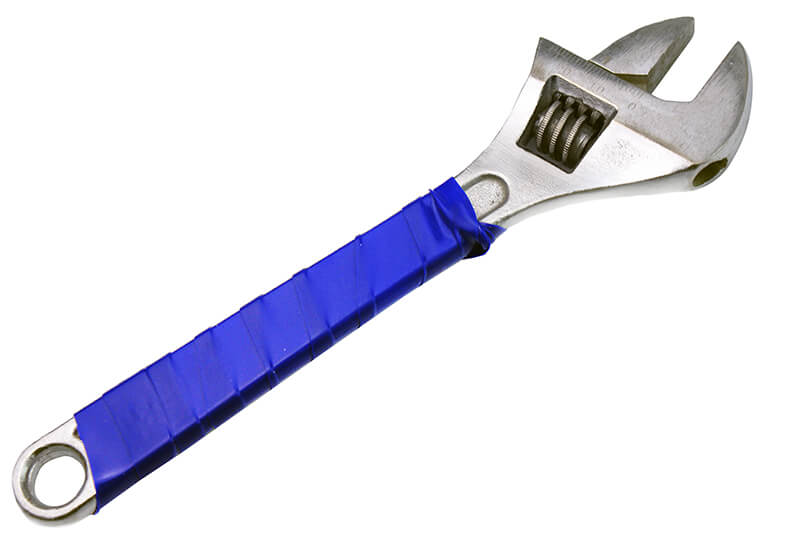 What Are The Best Strips for Tool Handles?
What Are The Best Strips for Tool Handles?
When it comes to enhancing the grip on tool handles, Tenura's anti-slip strips stand out as the top choice. Their durable composition, easy application, and consistent non-slip properties make them the ideal solution for various tools. From garden tools to hand tools, the versatility of these strips ensures a secure and comfortable grip in every application.
Tenura's commitment to user-friendly solutions is evident in the easy application of anti-slip strips. Simply adhere them securely to handles and experience an enhanced grip that remains effective even after cleaning. The strips maintain their non-slip properties, ensuring a consistent and reliable performance.
How Do I Use Grip Strips?
Using Tenura's grip strips is a straightforward process that yields significant results. Start by cleaning the handle thoroughly to ensure proper adhesion. Then, apply pressure and wrap it securely around the handle. Press down to ensure a firm grip. The versatility of these strips allows users to adapt them to various handle shapes and sizes, making them a practical and customisable solution.
The unique composition of Tenura's anti-slip strips provides a non-intrusive yet durable solution. With increased friction and a secure hold, the strips showcase their effectiveness in daily activities. The easy-to-clean nature of these strips adds to their appeal, making them a practical and hygienic choice for homeware applications.
Imagine enjoying a hot cup of tea with unwavering confidence, knowing that your mug is secure in your hands. The application of anti-slip strips elevates these seemingly mundane activities, highlighting their effectiveness in enhancing comfort and usability, all while offering the convenience of easy cleaning.
The versatility of anti-slip strips extends across a spectrum of homeware items. From kitchen utensils to garden tools, the strips contribute to a safer and more enjoyable experience with everyday items. Tenura's range of anti-slip strips, available in two colours, empowers users to tailor their approach, adding a personal touch to their homeware.
In conclusion, the effectiveness of anti-slip strips in homeware applications is not only about transforming grip but also about personalisation and practicality. Tenura's commitment to offering these strips in vibrant colours, coupled with their easy cleaning and maintenance properties, ensures that users can enjoy the full potential of their homeware without compromise. Elevate your daily living experience with the assurance of improved grip, personalisation, and enhanced usability through Tenura's anti-slip solutions.
The Role of Technology in Maintaining Social Connections for People with Disabilities in a Post-Lockdown World
As heavily as COVID impacted the entire world, people with disabilities faced specific challenges during and beyond lockdown owing to three overriding factors: the increased risk of poor outcomes from this disease, reduced access to routine health care and rehabilitation, and the negative social impact caused by efforts to reduce contagion. Although lockdown is a thing of the past, the social effects of the pandemic are far from over. As reported by the BBC, COVID has resulted in the rise of remote work, with many companies resorting to a “hybrid” work model that has actually proven to be a great leveller in terms of equality, diversity, and inclusion. However, telecommuting also has its downside—greater isolation ad fewer opportunities for in-person interaction. How is technology working to bridge the divide and unite disabled people with their colleagues, friends, and family in the age of the “new normal?”
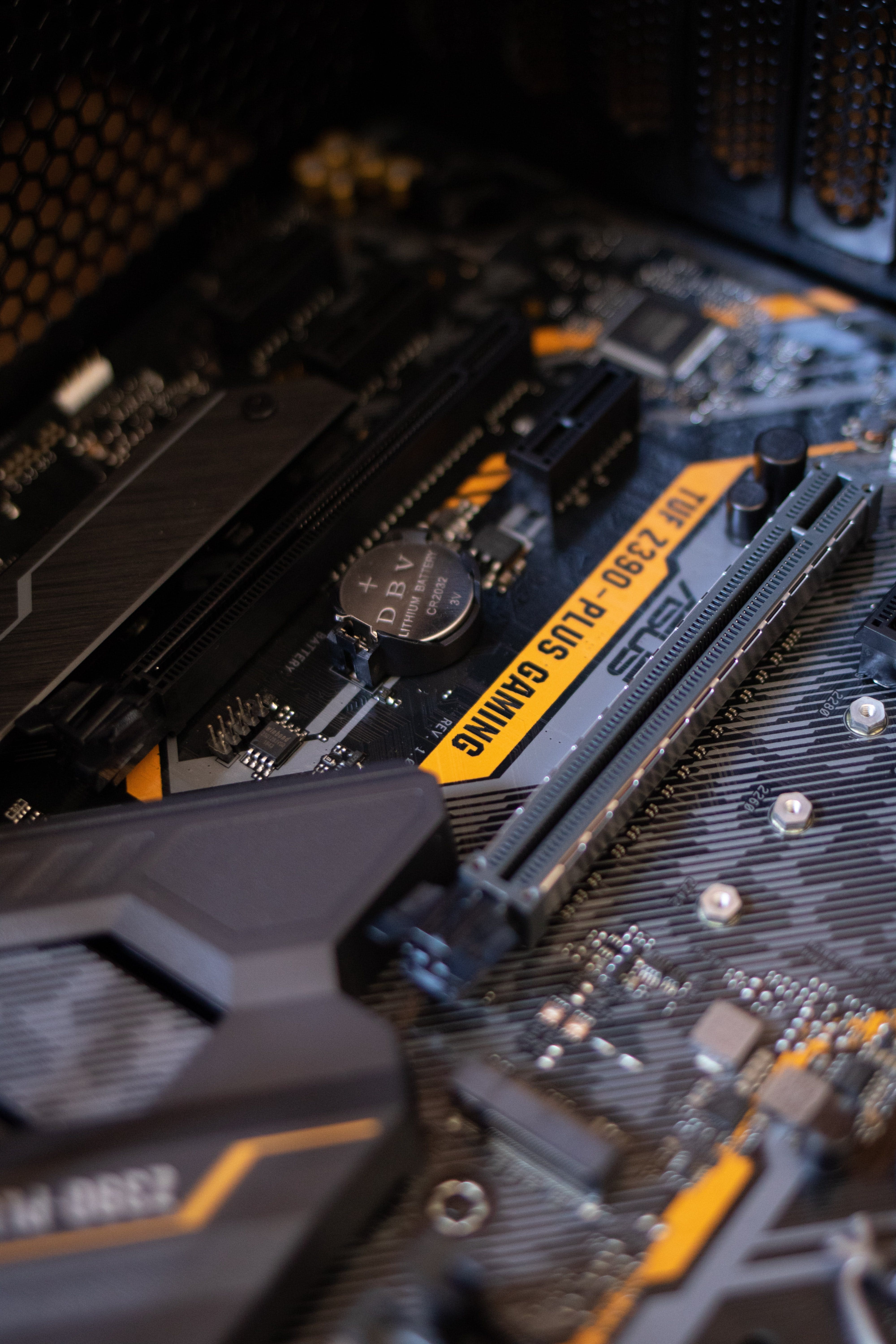
Entering Virtual and Real Worlds
Mixed reality headsets are one of the buzzwords in the tech sector. Anyone who enjoys gaming, working on a large “monitor” or interacting with others via video conference call is keen to get their hands on Apple’s new Vision Pro mixed reality headset. You simply put this headset on and start “working” on an enormous virtual screen whose size you can manipulate (imagine enjoying an online game with others on a virtual screen that is as large as your wall). You don’t need a mouse; you simply swipe and click items on the screen with your fingers. You can use all your usual apps, look at photos and video recordings, or work as you would on a typical monitor. You can also use the headset to make spatial FaceTime calls with scanned avatars that use AI to mimic the appearance and body language of the person wearing the headset. You can see all your contacts in “larger-than-life” size as they talk, and share documents and information as you normally would when working with a normal computer. It’s easy to see how this technology can help disabled people feel much more connected to their colleagues and friends, until they can see them in person, of course!
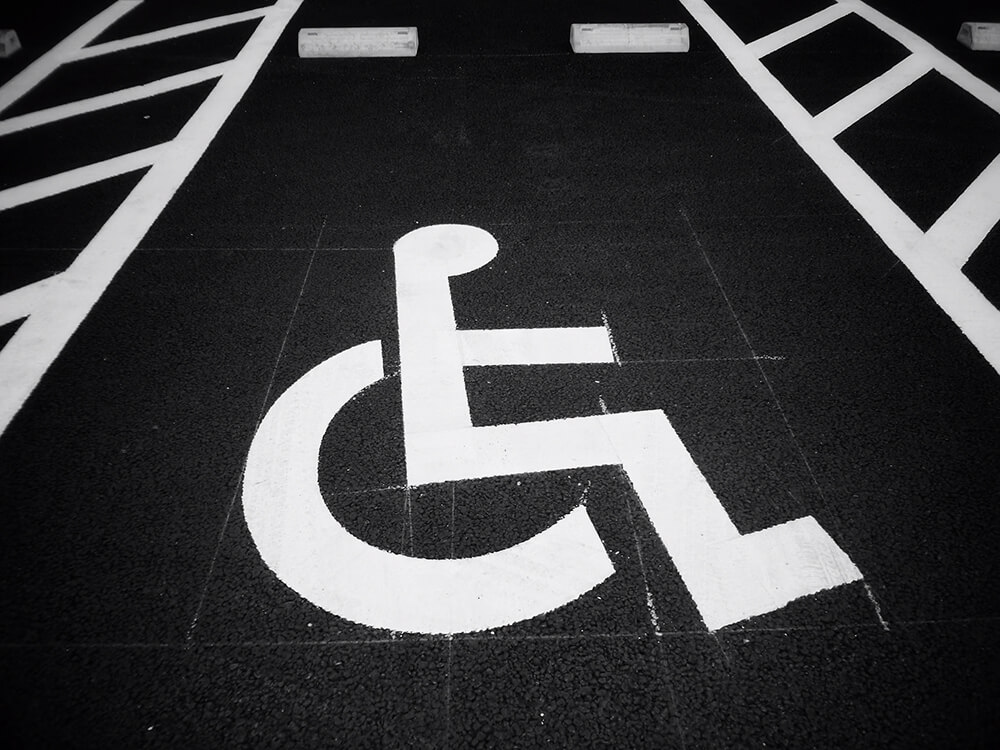 Reinventing the Wheelchair
Reinventing the Wheelchair
A person’s ability to move from one area to another play a crucial role in encouraging social interaction. Innovative wheelchair technology is improving mobility, safety, and accessibility, making it easier for wheelchair users to attend social events. Accessibility legislation has done plenty to boost accessible housing and rental policies. For instance, the law in most countries deems it necessary for landlords to accommodate disabled tenants via wheelchair access ramps, the installation of railings, adapted shouting and bathing facilities, and similar. However, it also helps for wheelchairs themselves to contain cutting-edge technologies that make movement easier. Currently, a few innovations that are making it easier to get around include self-driving, smart wheelchairs with sensors that use ultrasonics, radars, and cameras to perform tasks like slowing chairs down to prevent accidents.
Glasses That Speak
XRAI Glass is an innovative pair of glasses that allows deaf people to read real-time captions when talking to others. Instead of relying on lip-reading, deaf people can see that the other person is saying through the lenses. The glasses go a step further—they can even translate languages, vocal tones, accents, and pitches. They make an ideal tool for social interaction, work, education, and events. They come with a Bluetooth mic, which means that they can “see” conversations from a distance. Jodie Ounsley, a professional rugby player, has tried the glasses and stated that although she embraces her deafness with positivity, her disability “is a really isolating place at times. You miss out on a lot, and it’s a mental journey trying to lip-read.” She has stated that the glasses makes social interaction considerably easier. The smart glasses work with the XRAI app, which turns speech into subtitles in real time.
Although lockdown has long been over, the effects of COVID have continued into current times. Many disabled people are pleased to be working from home owing to the ease of this new arrangement, but remote work can be isolating. Technological innovations are constantly bridging the divide between remote and in-person work modes. Apple’s Vision Pro, smart wheelchairs, and XRAI Glass are just three of many technologies that are uniting disabled people with other people with and without disabilities.
How to Choose a Pet That is Suitable for the Disabled
Choosing a pet can be a joyful and rewarding experience for anyone, but for individuals with disabilities, the process requires extra consideration. It's essential to select a pet that not only brings companionship and joy but also suits the specific needs and abilities of the disabled person. In this guide, we'll explore some key factors to keep in mind when choosing a pet for a disabled individual, along while discussing the best pets for disabled.
1. Consider the Physical Abilities of the Individual 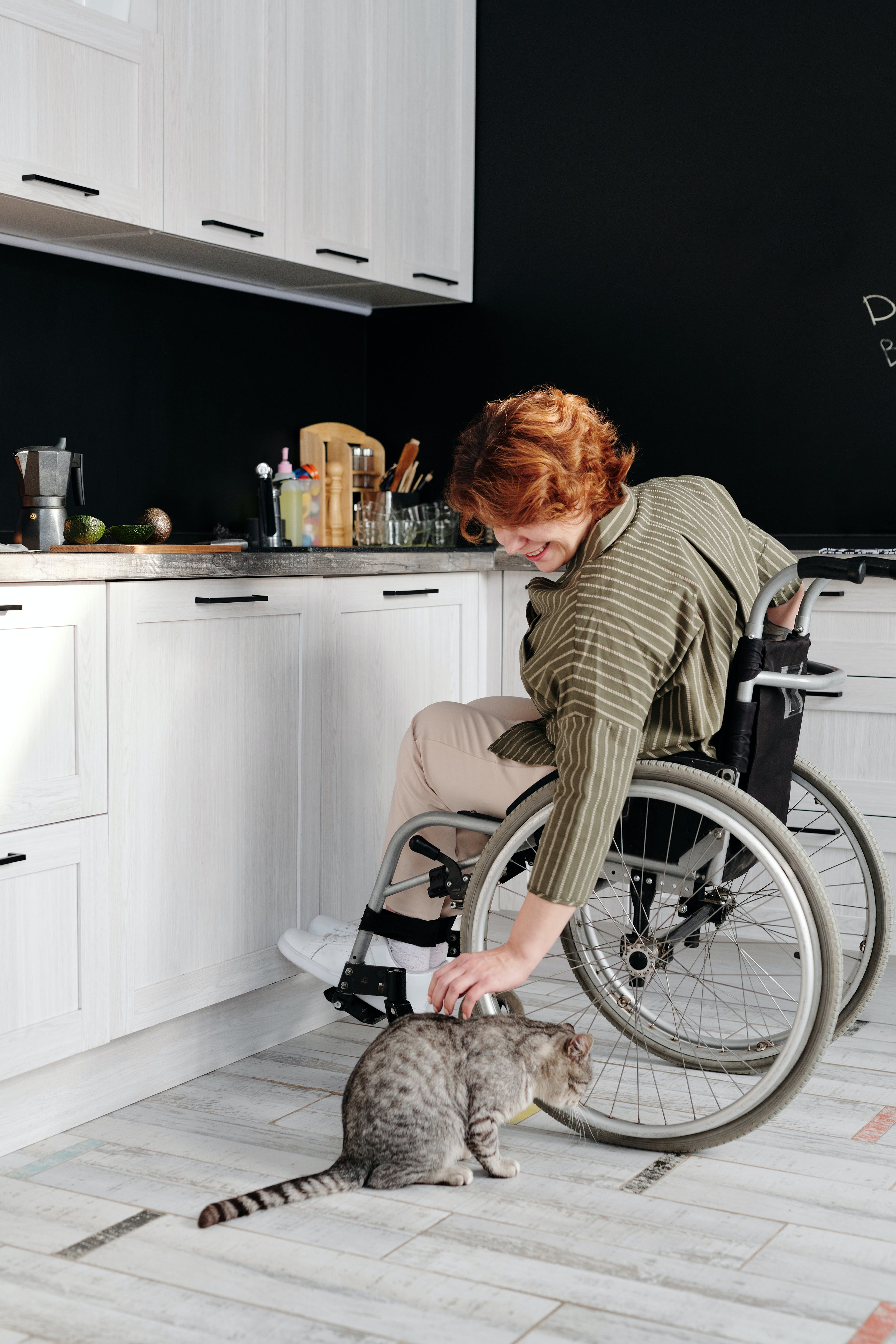
The first and most crucial step in choosing a pet for a disabled individual is to assess their physical abilities. Different disabilities have varying impacts on mobility and strength. For someone with limited mobility, a small and low-maintenance companion like a cat or a small dog may be a suitable choice. In contrast, individuals with more mobility may be able to care for larger dogs, which can offer both companionship and assistance.
2. Allergies and Sensitivities
People with disabilities might have allergies or sensitivities that can be triggered by pet dander, fur, or feathers. It's vital to consider these factors when choosing a pet. Hypoallergenic breeds or non-allergenic animals like reptiles and fish may be more appropriate for individuals with allergies or respiratory issues.
3. Energy Levels
The energy level of the pet should match the energy levels and abilities of the disabled person. High-energy dogs may be too demanding for someone with limited mobility. In such cases, consider lower-energy dog breeds or cats. Turtles, tortoises, or certain bird species can also be great options for people with a more laid-back lifestyle.
4. Training and Temperament
When choosing a pet for someone with a disability, it's important to consider the pet's temperament and its training requirements. Well-behaved, easy-to-train pets are often a better fit. Look for pets that are known for their gentle and patient nature, as these characteristics can make the pet-owner relationship more enjoyable and less stressful.
8. Financial Considerations
Owning a pet comes with financial responsibilities. It's important to consider the cost of food, veterinary care, grooming, and other pet-related expenses. Make sure that the individual or their support network can handle these costs comfortably. Although some health service providers can provide guide dogs which can assist you in areas of your disability.
6. Maintenance and Care
Consider the level of care and maintenance that the chosen pet will require. Disabled individuals might have varying levels of ability to care for their pets independently. Assess whether the individual can groom, feed, and clean up after the pet. If assistance is required, make sure there is a support system in place, with the Tenura product range we can help improve the maintenance for you and your companions with our range of daily living aids!
7. Housing and Space
Take into account the living situation of the disabled individual. Do they live in an apartment, a house, or a care facility? The available space will influence the choice of a pet. Smaller living spaces may be more suitable for cats, small dogs, or small mammals, whereas larger spaces can accommodate bigger dogs or even livestock in some cases.
8. Assistance Animals
Some disabled individuals require assistance animals to help with daily tasks. Service dogs, for instance, can be trained to perform tasks like fetching dropped items, opening doors, or providing emotional support. Ensure that you consult with a reputable service animal organisation to select and train a service dog that meets the specific needs of the disabled person.
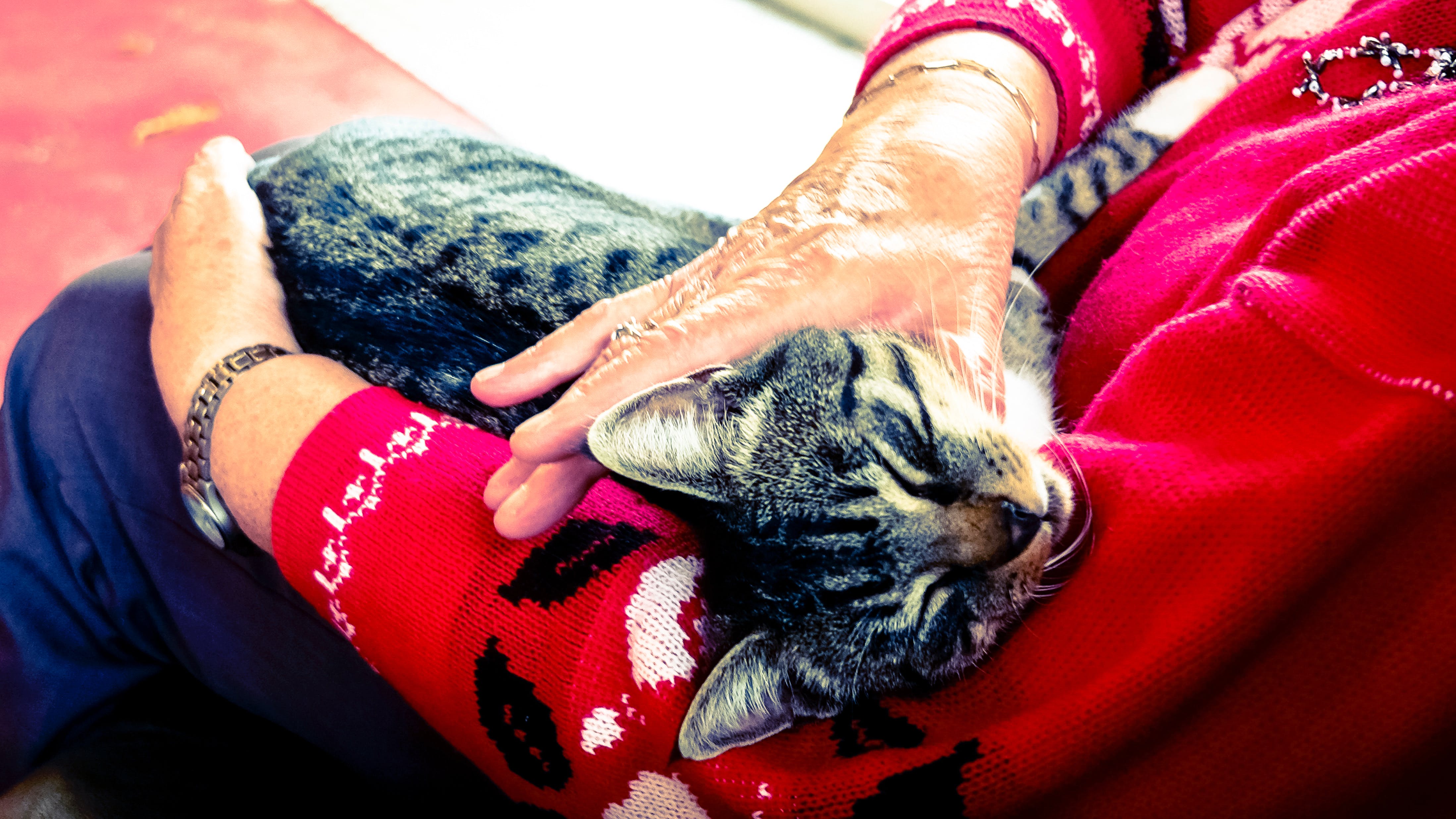
What Animals Can Be Used to Help The Disabled?
Cats and dogs are the most common animals used to assist people with disabilities. Dogs are highly versatile and can be trained to aid those with various disabilities, such as visual impairments, mobility challenges, and medical conditions like epilepsy or diabetes. Service dogs provide essential support by guiding their owners, retrieving items, and even alerting them to impending medical emergencies. Cats, although less commonly known as service animals, can offer valuable emotional support to individuals with disabilities. Their calming presence, companionship, and intuitive understanding of their owners' needs can be incredibly comforting. While dogs take on more active roles in assistance, cats excel in providing solace and emotional stability, making them essential companions for those with disabilities.
Can Animals Sense Disability?
Animals have a remarkable ability to sense disabilities in humans. Their acute senses and intuition enable them to detect physical and emotional changes in individuals. Many heartwarming stories and scientific studies have highlighted the incredible bond between animals and people with disabilities. Whether it's a service dog assisting someone with mobility challenges or a pet offering emotional support, these companions have an uncanny ability to understand and provide comfort to those in need. This unique connection between animals and individuals with disabilities is a testament to the profound sensitivity and empathy that our animal friends possess.
What Is The Best Dog Breed for Someone With a Disability?
When it comes to dog breeds for people with disabilities, several factors come into play. For individuals with mobility challenges, Labrador Retrievers, Golden Retrievers, and German Shepherds are often recommended as they are not only intelligent but also known for their gentle and helpful nature. However, the best dog breed ultimately depends on the specific needs and lifestyle of the disabled person. It's crucial to consult with a professional dog trainer or service dog organisation to make the right choice.
Choosing a pet for a disabled individual involves thoughtful consideration of their unique needs and abilities. The right pet can provide companionship, emotional support, and even assistance with daily tasks. By taking into account factors such as the individual's physical abilities, allergies, energy levels, temperament, and living situation, you can make a well-informed choice that will bring joy and fulfilment to both the person with a disability and their new furry or scaly friend. Learn more about animal therapy by reading our other blog.
If you're in need of daily living aids for a disabled individual, Tenura offers a range of high-quality products to improve daily life. To explore our offerings, please visit Tenura’s website.
Remember, the most crucial aspect of choosing a pet for someone with a disability is ensuring that the pet enhances their life, provides companionship, and supports their specific needs. Always consider the individual's comfort, safety, and happiness when making this important decision.
The Different Types of Jar Openers on the Market
Opening a stubborn jar can be a daily frustration for many, turning a simple task into an ordeal, especially for those who rely on disability aids. Whether it's a jar of pickles, pasta sauce, or any tightly sealed container, the struggle to gain access is real. Fortunately, there are various types of jar openers on the market designed to alleviate this common annoyance. In this article, we'll delve into the different types of disability aids, particularly jar openers, and shine a spotlight on Tenura's silicone jar openers as the ultimate solution.
Types of Jar Openers: 
Manual Jar Openers
Manual jar openers are the traditional go-to for many who use disability aids. They usually consist of a handheld device with adjustable teeth that grip the lid. While these openers can be effective, they require a fair amount of physical effort, which can pose a challenge for those with limited hand strength or dexterity, making disability aids like Tenura's jar openers a preferable choice.
Electric Jar Openers
Electric jar openers represent a significant leap in automation and are highly regarded as disability aids. These devices automatically twist the lid open with the push of a button. While they are convenient, they tend to be bulky and can be costly, making Tenura's silicone jar openers an accessible alternative.
Grip Mats
Grip mats are non-slip pads that can be placed under a jar to prevent it from moving while you twist the lid. While they can be effective for smaller jars, they may not provide sufficient leverage for stubborn or larger lids, making Tenura's jar openers, designed as disability aids, a more comprehensive solution.
Silicone Jar Openers by Tenura - A Versatile Disability Aid:
Now, let's focus on Tenura's silicone jar openers, a game-changer in the world of kitchen disability aids. These openers are not just another gadget; they are a testament to simplicity, effectiveness, and accessibility for those who rely on disability aids.
Tenura's silicone jar openers are crafted from high-quality, food-grade silicone. What sets them apart is their remarkable non-slip properties. The silicone material grips tightly to both the jar lid and your hand, providing the necessary traction to effortlessly twist the lid open. This feature is particularly advantageous for those with limited hand strength due to aging, arthritis, or other disabilities, making Tenura's jar openers a reliable choice among disability aids.
Versatile Applications Beyond Jars:
Tenura's silicone jar openers, renowned for their effectiveness in opening stubborn jar lids, offer versatile applications throughout daily life. These non-slip wonders can enhance independence by providing a secure grip on various surfaces. Use them on taps and faucets, making water control easier; wrap them around door knobs for improved accessibility; open medication bottles with ease; loosen tight caps on household items; secure cookware and utensil handles; and even enhance grip on exercise equipment during therapy or workouts. Tenura's silicone jar openers are more than just kitchen aids; they're versatile companions for conquering daily challenges and promoting self-reliance in various aspects of life.
Independence for the Elderly and Disabled Individuals:
Maintaining an independent lifestyle is a cherished goal, especially as we age or face mobility challenges due to disabilities. Simple tasks like opening a jar can become major obstacles. Tenura's silicone jar openers empower the elderly and disabled individuals to conquer these challenges and continue enjoying the autonomy they desire. With the non-slip grip, they can confidently open jars without assistance, preserving their self-reliance and dignity through the use of disability aids.
A Boon for Arthritis Sufferers and Occupational Therapists:
Arthritis can make everyday tasks painful and frustrating. The grip and twist required to open jars can exacerbate joint pain. Tenura's silicone jar openers offer a gentle yet secure grip, reducing the strain on arthritic hands. They are a welcome relief for individuals battling this condition or those undergoing occupational therapy, making it easier to access essential foods and maintain a balanced diet, thanks to these disability aids.
What is the Best Jar Opener for Seniors and Disabled Individuals?
Tenura's silicone jar openers have earned acclaim as the best disability aids for seniors and disabled individuals. Their non-slip grip and user-friendly design make them an ideal choice for those with limited hand strength, dexterity, or mobility issues. These openers provide a newfound sense of independence and convenience, allowing seniors to maintain their autonomy and making daily tasks much easier for disabled individuals who rely on disability aids.
In conclusion, the frustration of wrestling with a stubborn jar lid is a universal experience, especially for those who need disability aids. However, it doesn't have to be a daily annoyance. Tenura's silicone jar openers offer a simple, affordable, and effective solution as disability aids. They benefit the elderly and disabled individuals by promoting independence, providing relief for arthritis sufferers, and serving as a valuable resource for occupational therapists. With Tenura, the lid to convenience is always within reach, making these jar openers an essential part of disability aids. Say goodbye to jar-opening woes and hello to hassle-free access to your favourite treats.
Assistive Animals and Their Benefits for the Disabled
 Assistive animals are trained to provide for different needs and disabilities, and they can be a catalyst for patient success. These animals can help in various ways, such as:
Assistive animals are trained to provide for different needs and disabilities, and they can be a catalyst for patient success. These animals can help in various ways, such as:
- Neurological Functioning
- Sensory Support
- Mobility
- Therapy
- Offer Comfort and Companionship
So, What Are the Different Roles of Assistive Animals?
In our lives, assistive animals can enrich many areas, especially for those with a disability or who need the comfort of an animal to maintain a healthy, independent lifestyle. Animals can offer help through their unique characteristics; for example, dogs have a fantastic sense of smell, whereas horses can be a docile, friendly riding partner. So what jobs do these animals take on?
 Emotonal Support Animals
Emotonal Support Animals- Pschiatric Service Animals
- Medical Detection Dogs
- Disability-Assistance Animals
- Guide Dogs
- Autism Assistance Dogs
- Assisted Psychotherapy Animals
- Hearing Assistance Dogs
What do Emotional Support Animals do?
Animals can offer comfort in a way humans can’t. Animals don’t judge, and this quality lends itself to those seeking therapy/counselling or who need an animal companion.
What is the Role of Psychiatric Service Animals?
Psychiatric Service Animals are trained to perform roles that the owner cannot complete or requires prompts to complete. For example, people with an anxiety disorder may have a Psychiatric Service Animal that can predict panic attacks, and it will be trained to give support to the owner pre-panic attack, by picking up on heat rate.
What is the Role of a Medical Detection Dog?
Medical detection dogs use their enhanced sense of smell to detect medication. Scientists are also looking into the use of these dogs to detect illnesses such as Cancer.

What do Disability-Assistance Animals do?
For a disabled person, activities of daily living can be a struggle and prevent a person from being independent. An assistance dog can be trained to help the owner carry out ADLs such as transferring, toileting and dressing.
What’s the Role of Guide Dogs?
Guide dogs, one we are all familiar with, are helpful to those who lack vision. They judge special awareness keeping the owner away from danger and guiding them to safety.

What Do Autism Assistance Dogs Do?
Autism assistance dogs are typically used for paediatric help as more research has been conducted on the positive effects of children and assistive dogs. However, as you may know, those with autism can have a more polite word for immature mentality, which could mean we see the use of assistance dogs in the days of autistic adults in the future.
 Assisted Psychotherapy Animals
Assisted Psychotherapy Animals
Many types of animals can be used in animal-assisted therapy, ATT for short, which includes typical pets such as dogs, cats and guinea pigs but can include cows, birds and dolphins. Depending on the patient and animal, these therapy sessions may be conducted on a one-to-one basis or as a group.
Animal-assisted therapy comes in many forms and is an educational tool helping to learn to care for animals, caring for farm animals, grooming and pet health.
What Support Do Hearing Assistance Dogs Offer?
For people with a lack of hearing or completely deaf, a hearing assistance dog may be placed in their home. They are trained to distinguish the difference between doorbells, alarm clocks and smoke alarms.
Tenura Products to Help you Care for Your Pet
Animals are tricky to look after. They have many needs and are a costly expense. The clean-up after a pet is also a constant, but you can use Tenura products to help make life with a pet more effortless.
If you would like to explore Tenura Products to Help you Care for your pet you can via our blog. For example, placing food and water bowls on a Tenura Extreme mat can prevent them from sliding.
